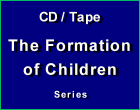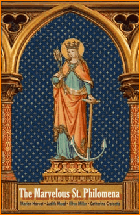Talks with Jan
 |
 |
 |
 |
 |
 |
 |
A Parable: The Punishment of the
Franciscans of the Immaculate
My friend Jan recently asked me about Francis’ recent humiliating shake-down of the Franciscans of the Immaculate (F.I.). She had read bits and pieces here and there, and was told that the Vatican action had contradicted the provisions in Benedict’s Summorum Pontificum. So, it would appear that two standing Popes were taking conflicting positions.
“Can you explain what happened?” she asked.
I was happy to comply, as I followed the situation closely and discussed it with TIA’s editor Atila Guimarães. So, Jan, please sit back for a summary and an interpretation, which may be quite different from what is being presented by conservative commentators.
History of the F.I.
The F.I. are a small but growing Institute established in Italy in 1970 as an offshoot of the Franciscan Order. The aim of the Founders, Fr. Stefano Maria Manelli and Fr. Gabriel Maria Pellettier, was to adopt the spirit of total consecration to the Blessed Virgin Mary following the example of Fr. Maximillian Kolbe.
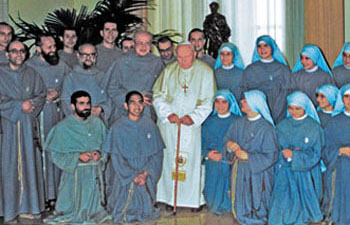 The new Institute has a conservative appearance with its religious men and women wearing a traditional grey-blue habit. Since its foundation to this day, however, the F.I. Institute has been inspired by the directives and spirit of Vatican II, which called for a “renewal in religious life” through a “return to the sources.” (from its website).
The new Institute has a conservative appearance with its religious men and women wearing a traditional grey-blue habit. Since its foundation to this day, however, the F.I. Institute has been inspired by the directives and spirit of Vatican II, which called for a “renewal in religious life” through a “return to the sources.” (from its website).
In 1990, the Institute was recognized at the diocesan level, and in 1998 received the approval of John Paul II. Supported by JP II and Benedict XVI, the F.I. grew rapidly. Today it counts more than 200 priests, 360 brothers and 400 nuns, as well as two tertiary societies composed of lay people.
A move in the direction of Tradition
Despite this Vatican II orientation, some parts of the F.I. started to celebrate the Tridentine Mass, especially after the publication of Summorum Pontificum in 2007. The 2008 Chapter of the Franciscan Friars took the decision to return to the “extraordinary form” of the Mass, all the while continuing to acknowledge and say the “ordinary form” or Novus Ordo Missae.
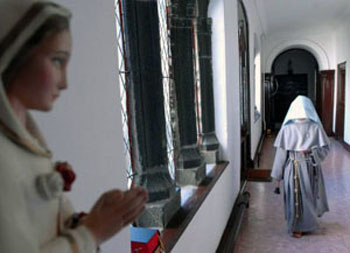 Founder and Superior General Stefano Manelli even made a point of saying primarily the New Mass everywhere in his visitations and on other occasions, always explaining the Institute does not want the exclusive use of the “extraordinary form of the liturgy” and was not rejecting Vatican II. (Aug. 3, 2013 response to the Vatican Insider)
Founder and Superior General Stefano Manelli even made a point of saying primarily the New Mass everywhere in his visitations and on other occasions, always explaining the Institute does not want the exclusive use of the “extraordinary form of the liturgy” and was not rejecting Vatican II. (Aug. 3, 2013 response to the Vatican Insider)
Some Friars and Sisters, however, were less “prudent.” They were not only exclusively saying the Tridentine Mass, but also speaking out against Vatican II as conflicting with the previous Magisterium.
In May 2012, the General Chapter of the Franciscan Sisters of the Immaculate, while admitting the co-existence of both forms, manifested a general preference for the “Vetus Ordo” (Old Mass) in their chapels. The exclusive use of the Tridentine Mass was requested by the contemplative branch of the Institute. (Three Official Responses on Rorate Caeli)
According to the F.I. Procurator General, Fr. Allessandro Apollonio, the troubles with the Vatican started when a handful of friars opposed to the Tridentine Mass complained to Rome that the original charism of the Institute was being subverted and the Old Rite was being preferred to the New (interview with the Vatican Insider). The complaints also mentioned the criticisms of Vatican II made by Friars and Sisters.
In 2012 Benedict XVI ordered an investigation into the Institute and an Apostolic Visitor was appointed. A year later in July 2013, the Vatican - now under the new sitting Pope Francis I – released its first flinty decision.
The decree of July 11, 2013
In a decree dated July 11, 2013 – which had the express approbation of Pope Francis – the Vatican dismissed Founder Fr. Stefano Manelli as Superior General. Capuchin Fr. Fidenzio Volpi replaced him as special Apostolic Commissioner. Volpi was instructed to quell dissent in the ranks, establish unity and review the finances. In effect, it was complete takeover of the Institute – priests, monks, sisters and tertiaries.
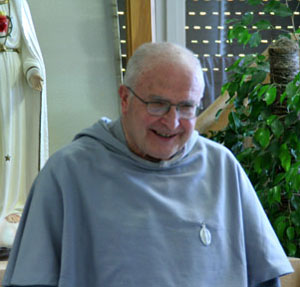 In the same decree, the Vatican directed every religious of the Institute to celebrate the liturgy according to “the ordinary rite.” The friars were forbidden to celebrate the Tridentine Mass and the religious sisters to have the Old Mass said in their convents without explicit authorization by Fr. Volpi. Compliance was ordered to begin on Sunday, August 11, 2013.
In the same decree, the Vatican directed every religious of the Institute to celebrate the liturgy according to “the ordinary rite.” The friars were forbidden to celebrate the Tridentine Mass and the religious sisters to have the Old Mass said in their convents without explicit authorization by Fr. Volpi. Compliance was ordered to begin on Sunday, August 11, 2013.
Subsequently, Volpi deposed the general government of the F.I. and placed Fr. Stefano Manelli under virtual house arrest, without any exterior communication. Friars who sent a petition to the Holy See were punished or threatened with expulsion. External efforts by laymen on behalf of the Institute, including a petition to the Pope, were ignored.
Fr. Manelli posted on the F.I.’s official website his wishes that all the members of the Institute “submit in obedience to the Holy Father and trust that this obedience will bring forth greater graces.”
Sterner sanctions follow on December 8
On the Feast of the Immaculate Conception, December 8, 2013, Volpi issued a new series of sanctions in the name of Francis. The Friars’ seminary was closed and its students sent to religious universities in Rome. All activities of the third orders were formally suspended. Ordinations of priests were suspended for a year, and those wishing to be ordained were required to formally accept the Novus Ordo and the teachings of Vatican II. Publications of the Institute were forbidden.
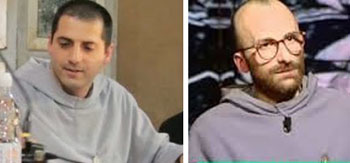 All members of F.I. were required to take an oath of fidelity to the Novus Ordo Missae and to Vatican Council II. This, of course, is to find and weed out any dissidents who question the Council or those who insist on exclusive use of the Tridentine Mass. Finally, to assure subservience among the religious sisters, Fr. Volpi threatened any non-compliant convents to be under a new spiritual director assigned by him. (Read the letter in English here)
All members of F.I. were required to take an oath of fidelity to the Novus Ordo Missae and to Vatican Council II. This, of course, is to find and weed out any dissidents who question the Council or those who insist on exclusive use of the Tridentine Mass. Finally, to assure subservience among the religious sisters, Fr. Volpi threatened any non-compliant convents to be under a new spiritual director assigned by him. (Read the letter in English here)
Some branches of the Institute, such as three monasteries in Liguria where the Tridentine Mass was being said with the permission of the Bishop, were closed in 2013 right before Christmas. The brothers were sent to far-away countries to “fulfill their missionary charism.” (Read more here)
As for the naïve calls to remove Volpi, Vatican spokesman Fr. Federico Lombardi defended the actions of the Apostolic Commissioner and summarily dismissed requests for his ouster.
This is where the case of the F.I. rests at the moment I write these lines.
‘Francis does not know’
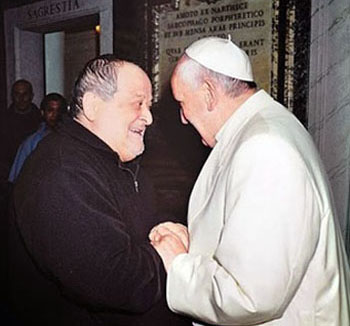 I have read emotional articles by some commentators who pretend Volpi is acting on his own initiative or on behalf of some ”evil third party” to punish the Franciscan Friars. These commentators believe the solution to the problem is to address the Pope begging him to remove Fr. Volpi.
I have read emotional articles by some commentators who pretend Volpi is acting on his own initiative or on behalf of some ”evil third party” to punish the Franciscan Friars. These commentators believe the solution to the problem is to address the Pope begging him to remove Fr. Volpi.
The truth is that the Commissioner Fr. Volpi is the personal representative of Pope Francis for this nasty job. Also, both decrees were issued expressly in Francis’ name. It is unrealistic to assume Francis does not know what is going on. I believe every serious Vatican analyst was fully aware beforehand that petitions demanding Volpi’s resignation were futile.
The Jesuit Pope has never been a friend of the Tridentine Mass, has criticized its followers as neo-Pelagians, and has warned about traditionalist groups “ideologizing the Vetus Ordo.”
‘Francis is against Benedict’
Other conservatives have claimed that Volpi’s edicts contradicted Summorum Pontificum. For example one claims Benedict’s document upheld that “the freedom to celebrate the Tridentine Mass belongs to the universal legislation of the Church and establishes a right for every priest” to say it.
In such case, he concludes, we would have the two present Popes in conflict, the bad Francis transgressing and waiving the legislation that the good Benedict established.
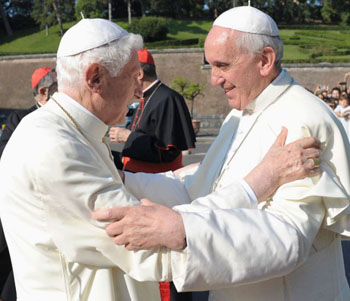 This argument relies on a simplistic and erroneous reading of Summorum Pontificum.
This argument relies on a simplistic and erroneous reading of Summorum Pontificum.
As Guimarães points out in his astute analysis of Motu Proprio, which I suggest readers study, “The apparently conservative motu proprio has some progressivist doctrinal demands.” First, priests who have doctrinal objections to the New Mass cannot exclude saying it. Second, priests who say the Mass must unquestioning accept the authority of Vatican II. These conditions must be met to say a Latin Mass for the public in order to “provide for the welfare of these faithful, avoid discord and favor the unity of the whole Church.”
Because some members of the F.I. were insisting on saying or hearing the Latin Mass only, as well as questioning parts of the Council, the Vatican action is regrettable, but perfectly consistent with Summorum Pontificum. This is, in fact, exactly what Fr. Lombardi affirmed, saying the decisions taken regarding the F.I.“are not a disavowal of the Motu Proprio.”
Summorum Pontificum carefully laid out the presuppositions for Fr. Volpi to do what he has done. So, there is no opposition between the two Popes. Those who pretend it exists are either blind or are playing some game to fool their audiences.
The case of the Franciscan Friars of the Immaculate is a parable. Francis is teaching a lesson to everyone who is attached to the Tridentine Mass: There is no condition to say the Latin Mass in the Conciliar Church unless one accepts the Novus Ordo and Vatican II.

“Can you explain what happened?” she asked.
I was happy to comply, as I followed the situation closely and discussed it with TIA’s editor Atila Guimarães. So, Jan, please sit back for a summary and an interpretation, which may be quite different from what is being presented by conservative commentators.
History of the F.I.
The F.I. are a small but growing Institute established in Italy in 1970 as an offshoot of the Franciscan Order. The aim of the Founders, Fr. Stefano Maria Manelli and Fr. Gabriel Maria Pellettier, was to adopt the spirit of total consecration to the Blessed Virgin Mary following the example of Fr. Maximillian Kolbe.

F.I. friars and sisters pose with patron JPII
In 1990, the Institute was recognized at the diocesan level, and in 1998 received the approval of John Paul II. Supported by JP II and Benedict XVI, the F.I. grew rapidly. Today it counts more than 200 priests, 360 brothers and 400 nuns, as well as two tertiary societies composed of lay people.
A move in the direction of Tradition
Despite this Vatican II orientation, some parts of the F.I. started to celebrate the Tridentine Mass, especially after the publication of Summorum Pontificum in 2007. The 2008 Chapter of the Franciscan Friars took the decision to return to the “extraordinary form” of the Mass, all the while continuing to acknowledge and say the “ordinary form” or Novus Ordo Missae.

Some convents were insisting on having exclusively the Tridentine Mass
Some Friars and Sisters, however, were less “prudent.” They were not only exclusively saying the Tridentine Mass, but also speaking out against Vatican II as conflicting with the previous Magisterium.
In May 2012, the General Chapter of the Franciscan Sisters of the Immaculate, while admitting the co-existence of both forms, manifested a general preference for the “Vetus Ordo” (Old Mass) in their chapels. The exclusive use of the Tridentine Mass was requested by the contemplative branch of the Institute. (Three Official Responses on Rorate Caeli)
According to the F.I. Procurator General, Fr. Allessandro Apollonio, the troubles with the Vatican started when a handful of friars opposed to the Tridentine Mass complained to Rome that the original charism of the Institute was being subverted and the Old Rite was being preferred to the New (interview with the Vatican Insider). The complaints also mentioned the criticisms of Vatican II made by Friars and Sisters.
In 2012 Benedict XVI ordered an investigation into the Institute and an Apostolic Visitor was appointed. A year later in July 2013, the Vatican - now under the new sitting Pope Francis I – released its first flinty decision.
The decree of July 11, 2013
In a decree dated July 11, 2013 – which had the express approbation of Pope Francis – the Vatican dismissed Founder Fr. Stefano Manelli as Superior General. Capuchin Fr. Fidenzio Volpi replaced him as special Apostolic Commissioner. Volpi was instructed to quell dissent in the ranks, establish unity and review the finances. In effect, it was complete takeover of the Institute – priests, monks, sisters and tertiaries.

Superior Manelli calls for full submission to the Vatican intervention
Subsequently, Volpi deposed the general government of the F.I. and placed Fr. Stefano Manelli under virtual house arrest, without any exterior communication. Friars who sent a petition to the Holy See were punished or threatened with expulsion. External efforts by laymen on behalf of the Institute, including a petition to the Pope, were ignored.
Fr. Manelli posted on the F.I.’s official website his wishes that all the members of the Institute “submit in obedience to the Holy Father and trust that this obedience will bring forth greater graces.”
Sterner sanctions follow on December 8
On the Feast of the Immaculate Conception, December 8, 2013, Volpi issued a new series of sanctions in the name of Francis. The Friars’ seminary was closed and its students sent to religious universities in Rome. All activities of the third orders were formally suspended. Ordinations of priests were suspended for a year, and those wishing to be ordained were required to formally accept the Novus Ordo and the teachings of Vatican II. Publications of the Institute were forbidden.

Seminary rector Fr. Lanzetta, left, is sent to Austria;
Vice-rector Fr. Paolo Siano banished to Africa
Some branches of the Institute, such as three monasteries in Liguria where the Tridentine Mass was being said with the permission of the Bishop, were closed in 2013 right before Christmas. The brothers were sent to far-away countries to “fulfill their missionary charism.” (Read more here)
As for the naïve calls to remove Volpi, Vatican spokesman Fr. Federico Lombardi defended the actions of the Apostolic Commissioner and summarily dismissed requests for his ouster.
This is where the case of the F.I. rests at the moment I write these lines.
‘Francis does not know’

Francis warmly greets Fr. Volpi, his representative, on December 8, the day new sanctions were enforced
The truth is that the Commissioner Fr. Volpi is the personal representative of Pope Francis for this nasty job. Also, both decrees were issued expressly in Francis’ name. It is unrealistic to assume Francis does not know what is going on. I believe every serious Vatican analyst was fully aware beforehand that petitions demanding Volpi’s resignation were futile.
The Jesuit Pope has never been a friend of the Tridentine Mass, has criticized its followers as neo-Pelagians, and has warned about traditionalist groups “ideologizing the Vetus Ordo.”
‘Francis is against Benedict’
Other conservatives have claimed that Volpi’s edicts contradicted Summorum Pontificum. For example one claims Benedict’s document upheld that “the freedom to celebrate the Tridentine Mass belongs to the universal legislation of the Church and establishes a right for every priest” to say it.
In such case, he concludes, we would have the two present Popes in conflict, the bad Francis transgressing and waiving the legislation that the good Benedict established.

Both Popes consistently applied Summorum Pontificum
As Guimarães points out in his astute analysis of Motu Proprio, which I suggest readers study, “The apparently conservative motu proprio has some progressivist doctrinal demands.” First, priests who have doctrinal objections to the New Mass cannot exclude saying it. Second, priests who say the Mass must unquestioning accept the authority of Vatican II. These conditions must be met to say a Latin Mass for the public in order to “provide for the welfare of these faithful, avoid discord and favor the unity of the whole Church.”
Because some members of the F.I. were insisting on saying or hearing the Latin Mass only, as well as questioning parts of the Council, the Vatican action is regrettable, but perfectly consistent with Summorum Pontificum. This is, in fact, exactly what Fr. Lombardi affirmed, saying the decisions taken regarding the F.I.“are not a disavowal of the Motu Proprio.”
Summorum Pontificum carefully laid out the presuppositions for Fr. Volpi to do what he has done. So, there is no opposition between the two Popes. Those who pretend it exists are either blind or are playing some game to fool their audiences.
The case of the Franciscan Friars of the Immaculate is a parable. Francis is teaching a lesson to everyone who is attached to the Tridentine Mass: There is no condition to say the Latin Mass in the Conciliar Church unless one accepts the Novus Ordo and Vatican II.

Posted January 22, 2014
______________________
______________________



